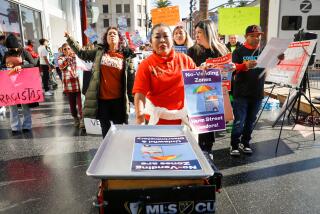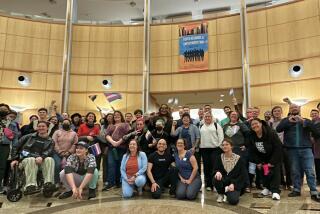6 Cities Break the Spell Against Fortune-Tellers
- Share via
Six South Bay cities have ended their bans on fortune-telling and related activities in response to a state Supreme Court case, and two other cities are considering similar action, but officials do not foresee a siege of seers.
In some cases, cities have imposed high license fees to pay for background checks on fortune-tellers.
The Supreme Court ruled Aug. 15 in favor of a fortune-teller who had sued the city of Azusa, claiming that the city’s ban on fortune-tellers violated her constitutional right of free speech.
Torrance Acted Fast
As the suit progressed through the judicial system, city officials around the South Bay monitored the case. In Torrance, for example, the City Council repealed its ban on fortune-telling in February, 1984, shortly after a decision in the Azusa fortune-teller’s favor by the 2nd District Court of Appeal. One fortune-teller has since established a business in Torrance.
Lomita, Rolling Hills Estates, Lawndale, Manhattan Beach and Hermosa Beach also repealed their bans, some in anticipation of the Supreme Court decision and some in reaction to it.
The Palos Verdes Estates City Council will consider an ordinance repealing its ban Oct. 8. Gardena is drafting a similar ordinance.
Carson and El Segundo are the only South Bay cities that still have bans in effect, but Nathan Manske, director of community safety for Carson, said officials there are considering changing the ban. Barbara Lansberg, a legal specialist for El Segundo, said she is not sure whether the city will change its law.
Redondo Beach, Rancho Palos Verdes, Hawthorne, Avalon, Rolling Hills and Inglewood have never had bans on fortune-telling, officials said.
Redondo Has Had Most
City Manager Tim Casey said Redondo Beach has had as many as six fortune-tellers. “They have regular business licenses,” he said, adding that the city has had no complaints. Fortune-tellers “coexist peacefully” with residents and other businesses, he said.
Although it never had a ban, Inglewood has never had any fortune-tellers either, City Manager Paul Eckles said. The reason may be the city’s $35-a-day business license fee for seers.
“That, I suspect, would keep the number of licensees down,” Eckles said. Did the city purposefully impose a high fee to deter fortune-telling? “You’d have to speculate on that,” Eckles said.
In removing its ban on fortune-telling, Lawndale imposed a $348 annual business license fee, much higher than the $57.75 basic fee that most businesses pay. The extra money will go to pay the Los Angeles County Sheriff’s Department to do background checks on applicants.
In banning fortune-telling, many cities cited a perception that it is intrinsically a fraudulent business, a view that the Supreme Court acknowledged in its decision. “I guess people even have a right to be hoodwinked,” Lomita Mayor Charles Belba remarked when his City Council passed its ordinance last Aug. 19.
Most Are Gypsies
Barry Fisher, a Los Angeles attorney who represented the fortune-teller in the Azusa case and has represented other prognosticators in the South Bay and Orange County, said the bans were a result of discrimination against Gypsies, the ethnic group of many fortune-tellers.
“They’re a racial and cultural minority which have been discriminated against throughout history,” Fisher said, adding that because of the basically unassimilated life style of most Gypsies, they have been misunderstood.
“These businesses are not any more fraudulent than religion, political forecasts, or forecasting the weather,” Fisher said.
“There’s good and bad in everything in this world,” Redondo Beach fortune-teller Madame Bonnie said.
Despite the removal of the bans, most South Bay officials said they do not expect a big increase in fortune-telling.
City Administrator Walker Ritter said Lomita has received only one application from a fortune-teller since the repeal. Does he expect more?
“I can’t answer a question like that,” he said. “I can’t tell the future.”
More to Read
Sign up for Essential California
The most important California stories and recommendations in your inbox every morning.
You may occasionally receive promotional content from the Los Angeles Times.










